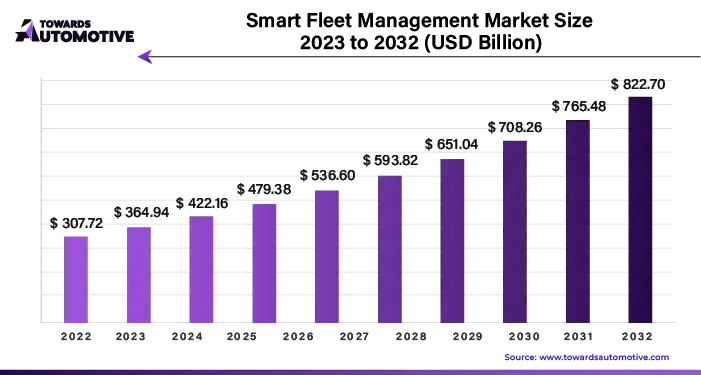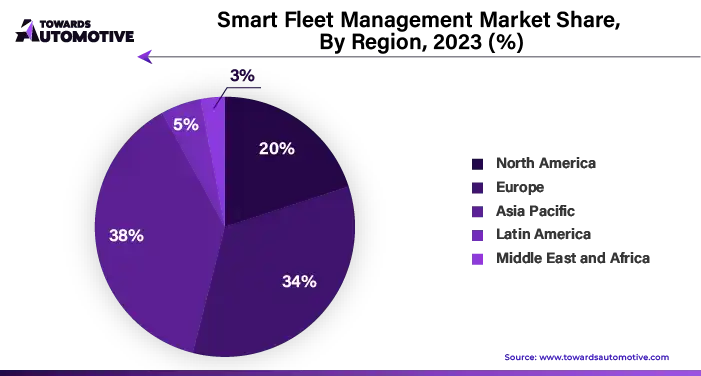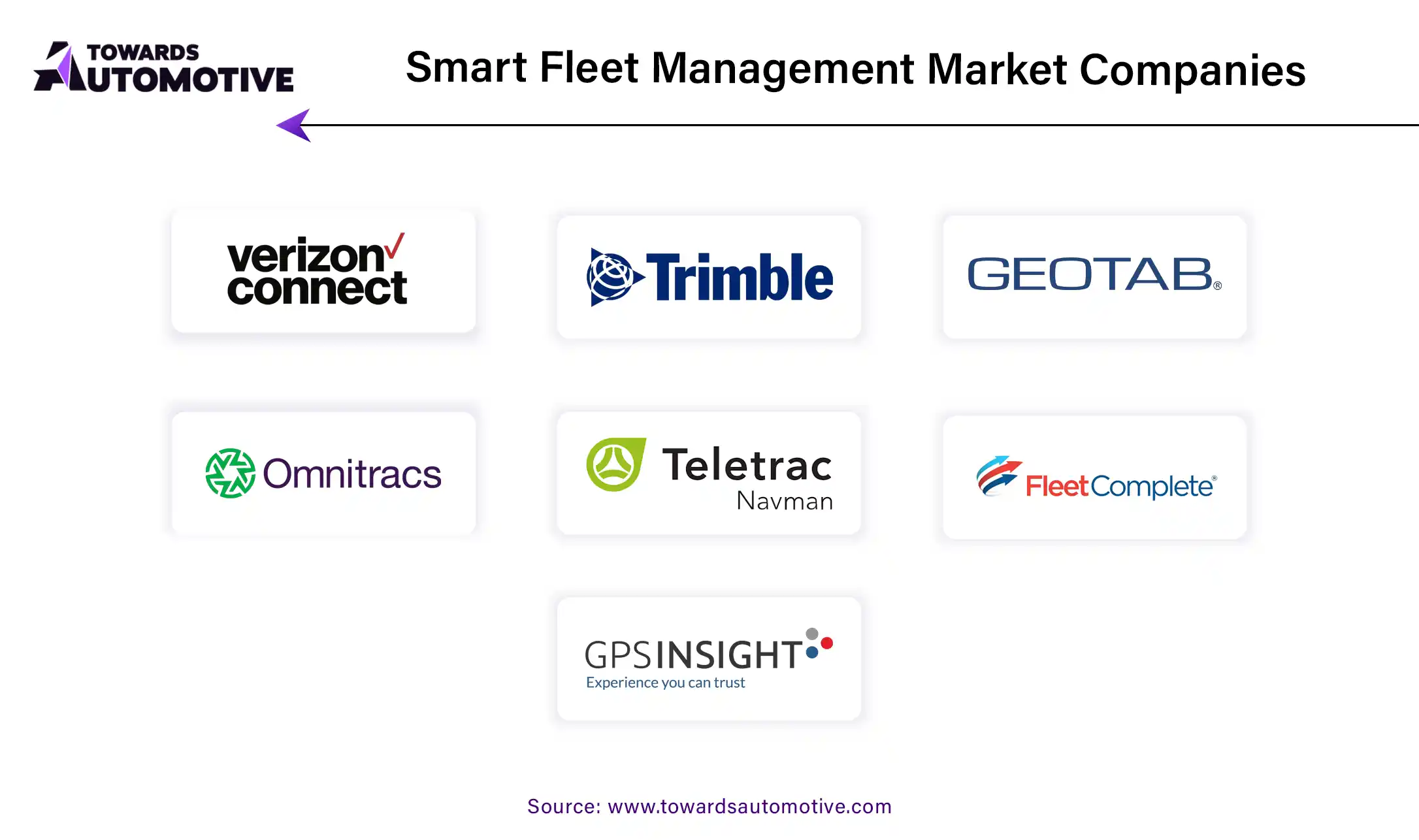October 2025
The smart fleet management market is projected to reach USD 1,024.05 billion by 2034, expanding from USD 382.91 billion in 2025, at an annual growth rate of 11.55% during the forecast period from 2025 to 2034.The growing demand for enhancing operational efficiency and vehicular safety has increased the demand for advanced solutions, thereby driving the industry in a positive direction.
Additionally, the rising deployment of cloud-based fleet management platforms coupled with ongoing trend of smart transportation is playing a vital role in shaping the industrial landscape. The rapid adoption of autonomous vehicles in developed nations along with growing deployment of electric vehicles for operating ride-hailing services is expected to create opportunities for the market players in the upcoming days.

The smart fleet management market is a crucial sector of the automotive industry. This industry deals in developing advanced fleet management platforms in different parts of the world. These platforms are designed for tracking several modes of transportation including roadways, marine, railway and airways. If finds application in tracking, ADAS, optimization, fuel cards, automatic vehicle identification and some others. The increasing sales of electric vehicles in different parts of the world has contributed to the industrial expansion. This market is expected to grow significantly with the rise of the advanced software industry across the globe.
The major trends in this market consists of AI-based fleet management platform, rapid investment in railways and growing cases of vehicle thefts.
The market players are engaged in developing AI-enabled fleet management solution to cater the needs of the fleet operators. For instance, in January 2025, ZF launched an AI-based fleet management platform in India. This new platform is designed for optimizing operations and boosting efficiency in commercial vehicle fleets. (Source: Autocar Professional)
The government of several countries such as India, China, the U.S., Germany, France and some others has invested significantly for developing the railway infrastructure. For instance, in March 2025, the government of India announced to invest around Rs 16.7 lakhs crore. This investment is done for strengthening the railway infrastructure across the country. (Source: The Times of India)
The cases of car thefts has increased rapidly in different parts of the world, thereby increasing the demand for advanced car tracking solutions. According to the NICB, around 850708 motor vehicle theft cases were encountered in the U.S. during 2024. (Source: Insurance Information Institute)
The roadways segment dominated the market. The growing adoption of advanced fleet management solutions by fleet operator for tracking commercial vehicles has driven the industrial expansion. Additionally, the trend of purchasing autonomous vehicles coupled with partnerships among market players to develop advanced fleet management platforms is expected to drive the growth of the smart fleet management market.
The railways segment is expected to rise with the fastest CAGR during the forecast period. The integration of AI-enabled fleet management solutions in railways for enhancing safety and security has boosted the market expansion. Additionally, numerous benefits of fleet management solutions in railways including proactive maintenance, performance analysis, cost reduction, real-time monitoring, tracking and some others is expected to drive the growth of the smart fleet management market.
The tracking segment held the largest share of the industry. The growing emphasis on tracking commercial vehicles by fleet operators has increased the demand for smart fleet management solutions, thereby driving the industrial expansion. Moreover, rapid incidences of car thefts has urged the passenger car owners to integrated advanced tracking systems that in turn is expected to drive the growth of the smart fleet management market.
The ADAS segment is expected to grow with the highest CAGR during the forecast period. The increasing adoption of ADAS integrated vehicles in developed nations has boosted the market growth. Additionally, rapid investment by market players for developing advanced fleet management solutions to control ADAS features is expected to foster the growth of the smart fleet management market.

North America led the smart fleet management market. The growing adoption of ride-hailing services in several countries such as the U.S. and Canada has driven the market expansion. Additionally, the increasing demand for autonomous vehicles coupled with rise in number of fleet management startups is shaping the industry in a positive direction. Moreover, the presence of several market players such as General Motors, Sierra Wireless, Cisco Systems and some others is expected to propel the growth of the smart fleet management market in this region.
Asia Pacific is expected to rise with the fastest CAGR during the forecast period. The rising cases of vehicle theft cases in numerous countries such as Japan, China, South Korea, India and some others has driven the market expansion. Also, rapid investment by government for strengthening the marine infrastructure coupled with constant development in the logistics sector is playing a vital role in shaping the industrial landscape. Moreover, the presence of various market players such as Samsung Electronics, Hitachi Corporation, Tech Mahindra and some others is expected to foster the growth of the smart fleet management market in this region.

The smart fleet management market is a highly fragmented industry with the presence of several dominating players. Some of the prominent companies in this industry consists of Zonar Systems, Inc. (USA), Continental AG (Germany), Robert Bosch GmbH (Germany), Verizon Connect (USA), Geotab Inc. (Canada), Trimble Inc. (USA), Omnitracs, LLC (USA), Samsara Inc. (USA), MiX Telematics (South Africa), Teletrac Navman (USA), Fleet Complete (Canada), Motive (USA), IBM Corporation (USA) and some others. These companies are constantly engaged in developing advanced fleet management platforms and adopting numerous strategies such as collaborations, launches, acquisitions, joint ventures, partnerships, and some others to maintain their dominance in this industry.
By Mode of Transportation
By Connectivity
By Operation
By Application
By Region
October 2025
October 2025
September 2025
September 2025
We offer automotive expertise for market projections and customizable research, adaptable to diverse strategic approaches.
Contact Us